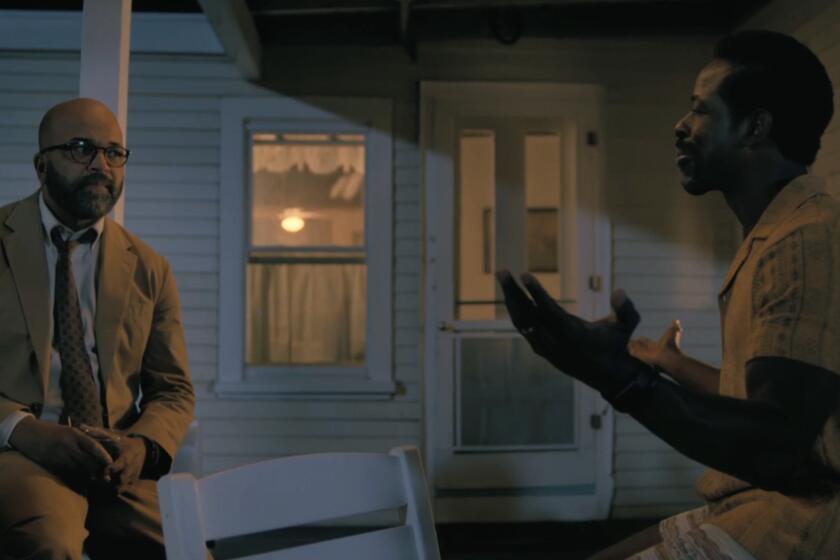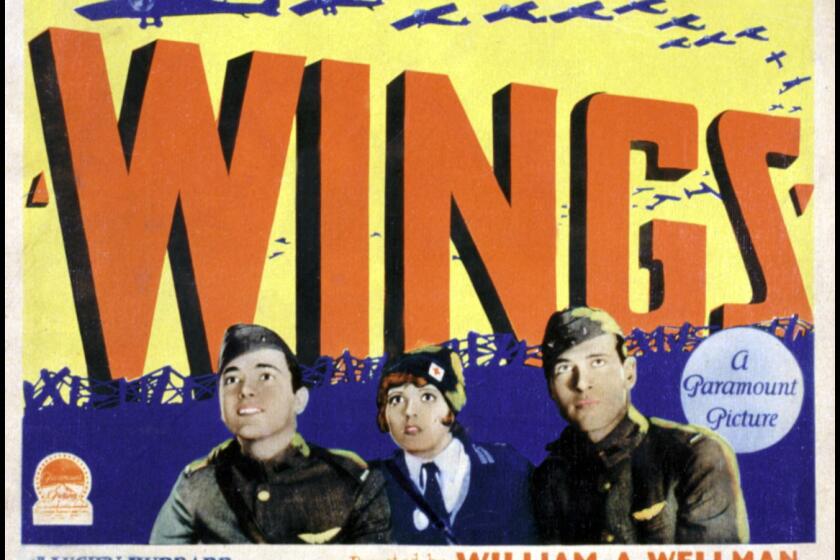‘American Fiction’s’ Oscar shows not all movies by Black directors need to be about violence and poverty

- Share via
In a night of Oscar awards that seemed to mostly ricochet between the brilliant “Oppenheimer” and the bizarre “Poor Things,” the adapted screenplay award for “American Fiction” by Cord Jefferson was a moment of triumph for Black storytellers. The smart, compelling satire about a Black academic and frustrated writer who finally capitulates to the thirst for stereotypical novels by Black authors about gangs and ghetto life was based on the 2001 book “Erasure” by Percival Everett.
In his acceptance speech, Jefferson made a plea to Hollywood to take more chances: “I understand that this is a risk-averse industry. I get it. But $200 million movies are also a risk, and it doesn’t always work out, but you take the risk anyway. And instead of making one $200 million movie, try making 20 $10 million movies — or 50 $4 million movies,” he said.
‘American Fiction,’ an Oscar-buzzy film starring Jeffrey Wright, began as Percival Everett’s scathing novel ‘Erasure.’ Here’s how the story transformed
After many others passed, someone took that chance on Jefferson — a first-time director. The result? A movie with a budget somewhere less than $10 million has earned more than $22 million so far and was nominated for five Oscars. In addition to Jefferson’s nomination, the movie garnered a lead actor nomination for Jeffrey Wright, a supporting actor nomination for Sterling K. Brown, a score nomination for composer and musician Laura Karpman and a best picture nomination. That’s quite a critical haul.
The Times editorial board always told Hollywood to give more chances to women and people of color — particularly as directors, actors and writers. Here is another case where someone did give a chance to a Black writer and first-time film director and it succeeded without a king’s ransom being spent in the process.
The Oscars should honor the magic of movies that, for almost a century, has been brought to life by stunt coordinators and stunt performers.
And Jefferson’s success has another lesson: Stories about Black people (or Latino people or any other people of color) don’t have to be about guns, gangs and drugs in order to sell to Hollywood. That’s not what diverse storytelling is about.
Backstage, talking to reporters, Jefferson noted that films about Black people don’t all have to take place on plantations or in projects, as he put it. “There is a market for depictions of Black life that are as broad and deep as any other depictions of people’s lives. Does that make sense?” he asked.

It absolutely makes sense. I have long resented that the universe of Black experience on the big screen (TV is much better) seems most often focused on poverty and violence. Don’t get me wrong. Struggle is noble and makes for compelling stories. But why can’t I watch Black people — particularly more Black women — playing complex characters in a multi-racial world struggling to run a company, struggling as journalists to uncover dark secrets about a company, church or government or struggling to figure out life post-divorce while living in a fabulous house in the Hamptons?
Hollywood is slowly broadening its vision of what kinds of stories nonwhite people can tell. Wright has had a long career of playing varied and rich characters, as have Denzel Washington, Samuel L. Jackson and Viola Davis, among others. But it’s a slow process. Too slow. If more talented filmmakers like Jefferson are given a chance to prove themselves with smart, interesting films that go beyond predictable themes and tropes about what life is like for Black people, Hollywood and the audience will be better off for it.
More to Read
A cure for the common opinion
Get thought-provoking perspectives with our weekly newsletter.
You may occasionally receive promotional content from the Los Angeles Times.












